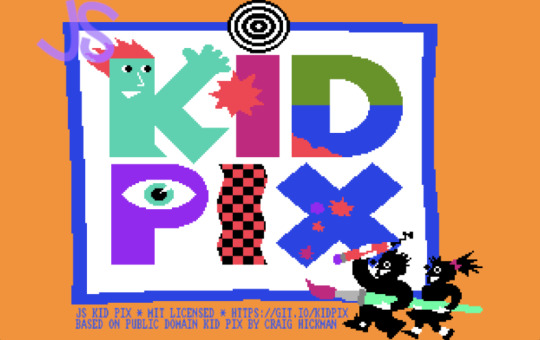Mills/Mag, they/she, 25. Current obsessions: All for the Game, Locked Tomb, Interview with the Vampire.
Don't wanna be here? Send us removal request.
Video
156K notes
·
View notes
Text
27K notes
·
View notes
Text
2K notes
·
View notes
Text
SO turns out the OP of the repost of this tiktok was a terf too so here's the video on its own without any weird gender comments and terf baggage.
And here's the collector's tiktok while we're at it, check her out if you want to see more of the cool stuff she has in her room.
3K notes
·
View notes
Text
Can't get a good job with any old bachelor's degree these days I knew I should've studied pyromancy
4K notes
·
View notes
Photo

Unleashing the Beast: Kentaro Miura’s Berserk
683 notes
·
View notes
Text
guy who's profiting from it: look, i don't like it either
19K notes
·
View notes
Text
Kid Pix just became pubic domain, so the remade (but pretty much exactly the same) version is now available here. It's uh, wild, highly recommend checking it out not only for the wonderful nostalgia but you can legit make some incredible looking stuff!

FIND IT HERE
125K notes
·
View notes
Text
tgr spoilers
jeandrew tether oh my god


72 notes
·
View notes
Text
tgr spoilers but can we also talk about how this book wasnt even about neil and he STILL managed to nearly die. fuck plot armor my dude has plot laser-targeting
#foxes resetting their days since an attempt on neils life sign back to 0#<- fjshfjftjtysjk#all for the game#tgr spoilers
404 notes
·
View notes
Text

had to be said
879 notes
·
View notes
Text
tgr spoilers

this is so fucking funny
1K notes
·
View notes
Text
Jeremy Knox, the character who saw everyone's bingo's for TGR and said ALRIGHT BET I CAN DO THEM ALL
476 notes
·
View notes
Text
tgr spoilers !!!
ive JUST finished it it is 2am where i am rn these r my very incoherent and chaotic first thoughts:
canon jeandrew interaction SAVE ME the way they talk about neil makes me sick god GOD
the interview...everything surrounding it...hannah bailey when i catch u...
FUCKBOY JEREMY KNOX YOU OWN ME GOD HE'S ACTUALLY HHHHHHH
jeremy i'm sorry i was truly TRULY unfamiliar with your game
reading this like: oh jeremy gets BITCHES (leo, faser, elias, the sheldon guy???, mystery guy with the shirt and cologne, dexter...this is getting out of hand)
NEIL...get UP my baby bunny GET UP GIRL
sorry but the image of neil getting his ribs bashed in and curling up on the floor of the court in a ball...like that's my shayla...that's my bunny rabbit what the fuck ru doing to him....
grayson's dead WHO ELSE CHEERED
kevjean...oh they make me sick they make me SO SO SICK the way they interact with each other...there's so much flavour oh god
kevin being like "did u actually read any of the trojans' articles or where u too busy staring at jeremy's photos-" and jean elbowing him to shut him up KEVJEAN YOU ARE SO DEAR TO ME
kevin defending jean to the press YEP YEP I KNEW IT WHAT DID I FUCKING SAYYYYY
wow jer's backstory is even MORE fucked up and messy than i thought
that MESSY AHH ravens v foxes game...andrew's broken CLAVICLE god i was shaking
INSANE jerejean scene when they were getting ready for the banquet absolutely INSANE
jeremy lore goes CRAZY
andrew and his insanely acute gaydar...how i love you
andrew asking jean if grayson touched neil...andreil you make me so sick so insanely unwell about them
kevin and andrew not knowing abt neil's little visit to jean is SO funny to me
NEIL STILL BEING A LOUDMOUTHED LITTLE SHIT TO THE PRESS UGH I LOVE YOU SO
"fuck what i deserve. what about what i want?" modern poetry. to me.
jean beating bryson's ass...laila was SO real for being like that was so sexy...as a lesbian too...real asf
more of jeremy being a piece of shit please i love it so much jean was right it makes him SO much more interesting
kandrew and kevjean still going strong
jerejean is absolutely insane in this book like...it would be less obvious if they kissed tbh
"give me a name. i will kill him." GO FERAL JEAN GO FERAL GOD HE IS. SO FINE.
the way jean staring at annalise left a bad taste in MY mouth asw, jer real asf for getting jealous
jabberwocky moreau you are MINE
"why can't you fuck someone who respects you?" wow. what do i even say to that. wow.
teenage dirtbag jeremy is real and dear to me. sneaking into his ex-situationship's house through the window??? jumping down and stealing his mother's roses??? he's so sexy i'm sorry
JEAN you are HEALING how i love this man
"he's handsome. the dog is cute, too." AHHH RENEE I LOVE YOU I LOVE YOU I LOVE YOU
i like how the "spicy scenes" in this book were literally all just jer's hookups with random guys every five chapters or so
service top jeremy...he's like...always on my mind
jeremy CLOCKING kevjean so fast was crazy to me and kevin clocking jerejean asw...the trio we didn't know we needed
cody noticing the way jean says jeremy's name had me CRYING they were so real for that
cody and jean the best duo ever methinks
i like how every time jean thinks of jeremy in a romantic way he immediately backtracks and is like "let's not think about this"
"emotional procrastination" is one of the funniest terms i've ever heard
jean kissing cat's temple...he makes me violently, violently ill
jeanneil save me...i will always come back to you...
will not be recovering any time soon do not attempt to contact me
540 notes
·
View notes
Text
TGR SPOILERS!!!!!!!
Also HOW is jeremy gonna tell Jean not being allowed to pick his major is a mite bit hecked up when he didn’t even pick English bc he wanted it
104 notes
·
View notes

